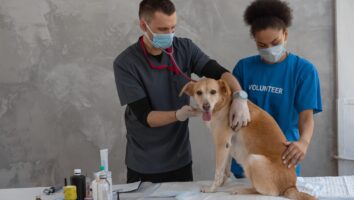Articles
Articles, questions and guides on pet care.
Types of Skin Infections in Cats
In cats, skin problems are caused by a vast range of conditions, from allergies and physical injury to external parasites and infections. Skin infections comprise a big portion of reported…
Glaucoma in Dogs and Cats
Though different in the level of perception and sensitivity, the anatomy of a dog and a cat’s eye is pretty much similar to ours and is also prone to the same eye problems that affect us. These…
How to Clean and Care for Your Pet’s Eyes at Home
Caring for a pet is a huge responsibility and includes making sure that they are free from harm and diseases. This includes providing the necessary preventive care. Dogs and cats require regular…
7 Tips to Prepare for Your Pet’s First Vet Visit
The first visit to the vet can be nerve-wracking both for you and your pet. It’s only natural for them to be nervous. Your furry friend doesn’t understand the point of a veterinary visit. But you…
Why are my dog’s eyes always watery?
Almost all dog owners have probably seen their canine buddies have teary eyes, which can appear as if they’ve been crying. There are several different causes for excessive eye discharge in dogs,…
Flea and Tick Medication Guide for Pet Parents
Fleas and ticks are external parasites that feed on the blood of their hosts, typically dogs, cats, and other mammals. Heavy infestations can lead to anemia and potentially serious complications…
Why does my dog have goopy eyes?
Like humans, dogs are susceptible to developing eye problems and will show a wide variety of signs depending on the specific cause or severity. A common symptom of an eye problem seen in dogs is…
Why are my dog’s eyes red?
Like humans, dogs are prone to developing eye problems. Signs associated with most eye conditions often include redness of the eyes, usually accompanied by other symptoms such as excessive tear…
Eye Injuries in Pets: Corneal Ulcers and Scratches
Corneal injuries, including scratches, abrasions, and ulceration, are common injuries in dogs and cats. Regardless of the cause, all eye injuries should be addressed immediately to avoid serious…
Gallbladder Disease in Dogs
One of the important gastrointestinal (GI) organs in dogs is the liver and its counterpart, the gallbladder. It is responsible for many functions, including the digestion and absorption of fatty…
Splenectomy: What happens when your dog’s spleen is removed?
The spleen is one of the lesser-known organs in the body. Not everyone knows what the spleen does, let alone that they exist in a dog’s body. And though the organ performs important functions in…
Causes and Treatment of High Blood Pressure in Cats
High blood pressure, also called hypertension, is a serious problem in senior cats. Feline hypertension may be primary (without any underlying medical problem) or secondary (caused by another…
High Blood Pressure (Hypertension) in Dogs
High blood pressure (also called hypertension) is an abnormal increase in blood pressure. A dog is said to be hypertensive when systolic blood pressure (SBP) exceeds 160 mmHg. The symptoms exhibited…
Causes of Cardiomyopathy in Cats
Cardiomyopathy is a group of diseases that affect the muscles of the heart. It is the most common form of heart disease diagnosed in cats and the most common cause of heart failure. Continue reading…
Types of Cardiomyopathy in Dogs
Cardiomyopathy is a common heart disease in dogs. It includes any disorder that affects the muscles of the heart which can eventually lead to the heart losing its ability to pump blood efficiently.…
Does my dog need a pacemaker?
Pacemakers are a life-saving intervention. These electronic devices can also help improve the quality of life in dogs diagnosed with certain heart problems. An artificial pacemaker is implanted to…
Ventricular Tachycardia in Dogs and Cats
Tachycardia is a medical term for rapid heart rate. When tachycardia originates from the ventricles of the heart, it is known as ventricular tachycardia (VT or V-Tach). It is a serious form of…
Atrial Fibrillation in Dogs and Cats
Atrial fibrillation (AF) is the most common and clinically important type of arrhythmia in veterinary medicine. It is rarely a medical emergency in itself. But since it’s an important complicating…
























